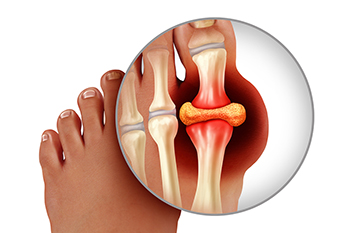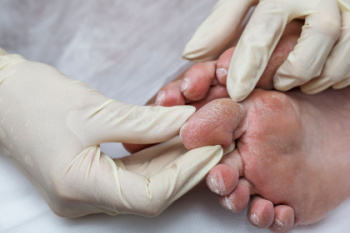Items filtered by date: May 2025
Gout and Its Link to Kidney Disease

Gout is a type of inflammatory arthritis caused by the buildup of uric acid crystals in the joints, leading to sudden and severe pain, swelling, and redness. The big toe is often affected, and may be so painful that even the weight of a bed sheet can be unbearable. Acute gout refers to the sudden onset of intense symptoms, usually affecting one joint, most commonly the big toe. These episodes may last several days before subsiding. Chronic gout develops when uric acid levels remain elevated over time, leading to frequent flare-ups, joint damage, and the formation of hard deposits called tophi. Kidney disease is closely connected to gout because the kidneys are responsible for filtering uric acid from the blood. When kidney function declines, uric acid can accumulate, increasing the risk of gout. Similarly, chronic gout may contribute to kidney damage over time, creating a cycle that worsens both conditions. If you have symptoms of gout, it is strongly suggested that you include a podiatrist on your care team who can help you to manage this painful condition.
Gout is a foot condition that requires certain treatment and care. If you are seeking treatment, contact one of our podiatrists from Highpoint Foot & Ankle Center. Our practitioners will treat your foot and ankle needs.
What Is Gout?
Gout is a type of arthritis caused by a buildup of uric acid in the bloodstream. It often develops in the foot, especially the big toe area, although it can manifest in other parts of the body as well. Gout can make walking and standing very painful and is especially common in diabetics and the obese.
People typically get gout because of a poor diet. Genetic predisposition is also a factor. The children of parents who have had gout frequently have a chance of developing it themselves.
Gout can easily be identified by redness and inflammation of the big toe and the surrounding areas of the foot. Other symptoms include extreme fatigue, joint pain, and running high fevers. Sometimes corticosteroid drugs can be prescribed to treat gout, but the best way to combat this disease is to get more exercise and eat a better diet.
If you have any questions please feel free to contact our offices located in Chalfont, Doylestown, and Hatboro, PA . We offer the newest diagnostic and treatment technologies for all your foot and ankle needs.
Helping Seniors Prevent Falls by Managing Common Risk Factors

Preventing falls in the elderly requires attention to several common risk factors. Muscle weakness, especially in the legs, can negatively affect balance. Medication side effects, such as dizziness or drowsiness, may also increase fall risk. Chronic health conditions like arthritis, diabetes, or neurological disorders can interfere with mobility and coordination. Vision changes often make it harder to detect obstacles or judge distances. Inactivity over time can reduce strength and flexibility, making daily movements less steady. Additionally, risky behaviors like standing on a chair to reach high places further increase the chance of a fall. To reduce risk, older adults should stay physically active, use mobility aids when necessary, and ensure home safety. If you have fallen and injured your feet or ankles, it is suggested that you promptly contact a podiatrist who can treat various foot conditions, and guide you on additional fall prevention strategies.
Preventing falls among the elderly is very important. If you are older and have fallen or fear that you are prone to falling, consult with one of our podiatrists from Highpoint Foot & Ankle Center. Our practitioners will assess your condition and provide you with quality advice and care.
Every 11 seconds, an elderly American is being treated in an emergency room for a fall related injury. Falls are the leading cause of head and hip injuries for those 65 and older. Due to decreases in strength, balance, senses, and lack of awareness, elderly persons are very susceptible to falling. Thankfully, there are a number of things older persons can do to prevent falls.
How to Prevent Falls
Some effective methods that older persons can do to prevent falls include:
- Enrolling in strength and balance exercise program to increase balance and strength
- Periodically having your sight and hearing checked
- Discuss any medications you have with a doctor to see if it increases the risk of falling
- Clearing the house of falling hazards and installing devices like grab bars and railings
- Utilizing a walker or cane
- Wearing shoes that provide good support and cushioning
- Talking to family members about falling and increasing awareness
Falling can be a traumatic and embarrassing experience for elderly persons; this can make them less willing to leave the house, and less willing to talk to someone about their fears of falling. Doing such things, however, will increase the likelihood of tripping or losing one’s balance. Knowing the causes of falling and how to prevent them is the best way to mitigate the risk of serious injury.
If you have any questions, please feel free to contact our offices located in Chalfont, Doylestown, and Hatboro, PA . We offer the newest diagnostic and treatment technologies for all your foot care needs.
What to Know About the Diabetic Foot

Diabetes can cause serious problems in the feet, even from small cuts or pressure points. High blood sugar affects blood flow and nerve health, which means injuries may go unnoticed and heal slowly. Common issues include dry skin, numbness, tingling, and sores that do not heal. Without proper care, these problems can lead to infection or more serious complications. Checking your feet daily, wearing well-fitting shoes, and keeping skin moisturized can help prevent trouble. Regular visits to a podiatrist are also important to catch problems early. Even if your feet feel fine, changes can happen quickly. If you have diabetes and notice redness, swelling, or a sore that is not getting better, it is suggested you see a podiatrist for appropriate treatment.
Diabetic foot care is important in preventing foot ailments such as ulcers. If you are suffering from diabetes or have any other concerns about your feet, contact one of our podiatrists from Highpoint Foot & Ankle Center. Our practitioners can provide the care you need to keep you pain-free and on your feet.
Diabetic Foot Care
Diabetes affects millions of people every year. The condition can damage blood vessels in many parts of the body, especially the feet. Because of this, taking care of your feet is essential if you have diabetes, and having a podiatrist help monitor your foot health is highly recommended.
The Importance of Caring for Your Feet
- Routinely inspect your feet for bruises or sores.
- Wear socks that fit your feet comfortably.
- Wear comfortable shoes that provide adequate support.
Patients with diabetes should have their doctor monitor their blood levels, as blood sugar levels play such a huge role in diabetic care. Monitoring these levels on a regular basis is highly advised.
It is always best to inform your healthcare professional of any concerns you may have regarding your feet, especially for diabetic patients. Early treatment and routine foot examinations are keys to maintaining proper health, especially because severe complications can arise if proper treatment is not applied.
If you have any questions please feel free to contact our offices located in Chalfont, Doylestown, and Hatboro, PA . We offer the newest diagnostic and treatment technologies for all your foot and ankle needs.
Ankle Fracture? Don’t Wait for Treatment
Common Pickleball Foot and Ankle Injuries

Pickleball has become a popular sport among people of all ages, but the quick lateral movements, abrupt stops, and sudden pivots can lead to various foot and ankle injuries. Common pickleball injuries include ankle sprains, tendon inflammation, plantar fasciitis, and fractures on the inner side of the ankle. These injuries often occur when a player twists the ankle or lands unevenly during play. Fractures involving the inner ankle may require immobilization or surgery, depending on the severity. A podiatrist can evaluate your injury through a physical exam and imaging tests to determine the appropriate course of treatment. Medical care may involve casting, supportive devices, or surgery to stabilize the bones and restore function. Without proper treatment, these injuries can lead to chronic pain or instability, especially in the ankle joint. If you have sustained a foot or ankle injury while playing pickleball, it is suggested that you seek treatment from a podiatrist.
Sports related foot and ankle injuries require proper treatment before players can go back to their regular routines. For more information, contact one of our podiatrists of Highpoint Foot & Ankle Center. Our practitioners can provide the care you need to keep you pain-free and on your feet.
Sports Related Foot and Ankle Injuries
Foot and ankle injuries are a common occurrence when it comes to athletes of any sport. While many athletes dismiss the initial aches and pains, the truth is that ignoring potential foot and ankle injuries can lead to serious problems. As athletes continue to place pressure and strain the area further, a mild injury can turn into something as serious as a rupture and may lead to a permanent disability. There are many factors that contribute to sports related foot and ankle injuries, which include failure to warm up properly, not providing support or wearing bad footwear. Common injuries and conditions athletes face, including:
- Plantar Fasciitis
- Achilles Tendinitis
- Achilles Tendon Rupture
- Ankle Sprains
Sports related injuries are commonly treated using the RICE method. This includes rest, applying ice to the injured area, compression and elevating the ankle. More serious sprains and injuries may require surgery, which could include arthroscopic and reconstructive surgery. Rehabilitation and therapy may also be required in order to get any recovering athlete to become fully functional again. Any unusual aches and pains an athlete sustains must be evaluated by a licensed, reputable medical professional.
If you have any questions please feel free to contact our offices located in Chalfont, Doylestown, and Hatboro, PA . We offer the newest diagnostic and treatment technologies for all your foot and ankle needs.

